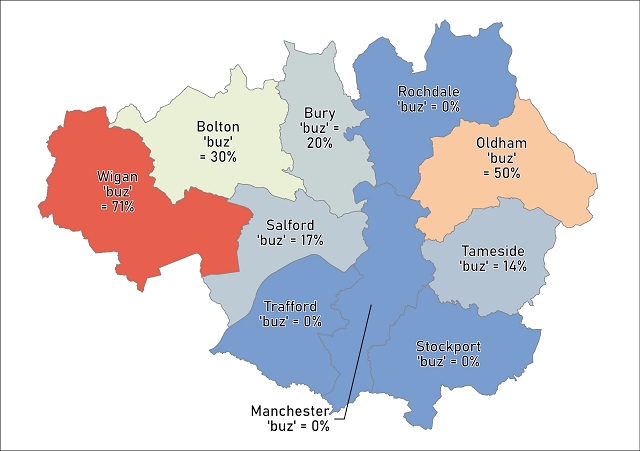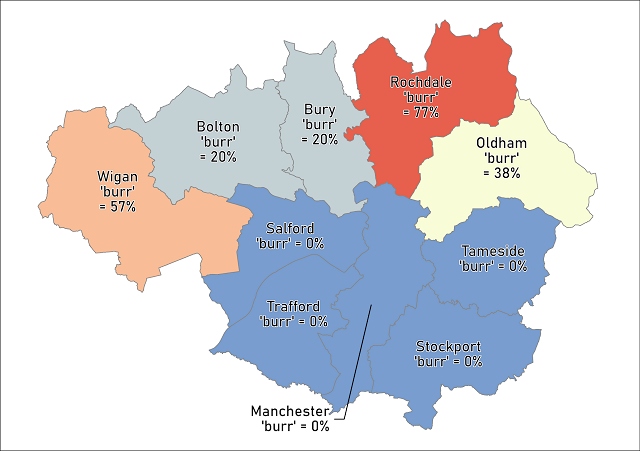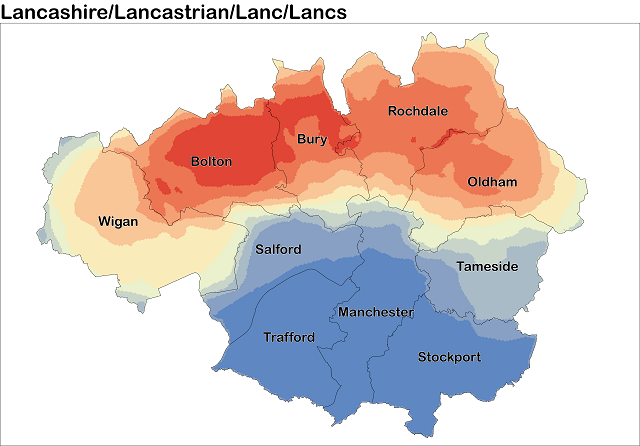Do you speak ‘Manc’, ‘Lancashire’ or ‘posh’? First findings from largest ever study of Greater Manchester accents and dialects revealed
Date published: 05 October 2021

Photo: Manchester Voices
Rochdalians are amongst the 'posh' dialect when it comes to pronouncing 'bus'
The debate as to whether we are Mancunians or Lancastrians has rumbled on for decades – but new research suggests that locals think there are actually four main distinct regional dialects – ‘Manc’, ‘Lancashire’, ‘Wigan’ and ‘posh’.
The Manchester Voices research project, led by sociolinguists at Manchester Metropolitan University, has been investigating how people speak across Greater Manchester’s 10 boroughs, and what people think and feel about these ways of speaking.
Read more: Linguistics project examines Greater Manchester's accents and dialectPublished: 19 November 2020
Emerging findings from the project show that people think the ‘Manc’ accent is situated mostly in the city of Manchester itself, while residents of South Manchester, Trafford and Stockport are more likely to sound ‘posh’.
While residents of the northern boroughs of Bury, Bolton, Rochdale and Oldham are characterised as speaking ‘Lancashire’, Wigan natives are thought to have a distinctive dialect all of their own – and more likely to catch the ‘buz’ or read a ‘bewk’ than their GM neighbours.
Manchester Voices is the most detailed ever research study of its type, and will eventually culminate in a permanent installation in Manchester Central Library that celebrates the diversity of language in the region.
The Manchester Voices research team comprises academics Dr Rob Drummond, Dr Holly Dann, Dr Sadie Ryan and a group of student research assistants including intern Jack Taylor.
Dr Dann, Research Associate at Manchester Metropolitan said: “This research gives a fascinating insight into the huge amount of accent and dialect variation between the boroughs of Greater Manchester. It also suggests that Greater Manchester residents are really good at picking up on these differences.
"For example, the results of the dialect mapping task suggested that Wigan is thought to have the most ‘unique’ accent and dialect, whereas Trafford and Stockport are less local sounding, and this was reflected in our analysis of the spoken data."
In the first stage of the research, conducted during the Covid lockdowns, researchers asked more than 350 people from the region to draw and describe the different accents and dialects on an online map, as well as asking people who were born and raised in one borough to submit a recording of themselves speaking.
Researchers analysed the responses by creating heatmaps, with the red areas showing where respondents labelled the different regions.

Taylor has analysed the 80 recordings submitted to the project of people who have lived most of their lives in one borough. Focussing on the pronunciation of the words ‘bear’ vs. ‘burr’, ‘book’ vs. ‘bewk’, ‘school’ vs. ‘skewl’, and ‘bus’ vs. ‘buz’, he found some interesting differences between the boroughs.
The team have mapped how these different pronunciations pattern across the region, finding that:
- The ‘bewk’ pronunciation of ‘book’ is most often found in Wigan
- People are more likely to catch a ‘buz’ in Oldham or Wigan
- Rochdale and Wigan locals are most likely to say ‘burr’ for ‘bear’
- People from all over Greater Manchester sometimes said ‘school’, ‘skewl’, or something in between, but Stockport and Trafford respondents were most likely to say ‘school’, and Wiganers said ‘skewl’ the most.
When compared to the public perceptions of accents and dialects in Greater Manchester, these findings reflect the suggestion that people in Trafford and Stockport may have less ‘local’ accents, and that Wigan is particularly distinctive.
The analysis also suggested that ‘burr’ and ‘bewk’ may be lessening over time, with younger people – and especially young women - being more likely to say ‘bear’ and ‘book’.
Dr Drummond, Reader in Sociolinguistics at Manchester Metropolitan, said: “It just shows how much the way we speak is connected to identity and self-perception. We can see important social distinctions reflected in the speech patterns we’re analysing – the distinction between the urban centre and the surrounding boroughs, for example, and generational divides too. Of course we still have more work to do before we can fully understand what these distinctions mean to people.”

are characterised as speaking ‘Lancashire’
The Manchester Voices research project is still ongoing, and the research team still want to hear from members of the public to build on these early findings.
They are currently touring the 10 boroughs in the Accent Van, a mobile recording booth where visitors can climb aboard and be interviewed by a talking computer about accents, dialects, and identity in Greater Manchester.
People can also take part from the comfort of their own homes by visiting the Virtual Accent Van.
Manchester Voices has also revealed the winners of Talking About Voices, a free online project for secondary school and A Level pupils in the Greater Manchester area. In the 2020/2021 school year, over 300 pupils took part, learning about language and identity while also learning how to make a podcast. They were then invited to make their own short podcast episode about how they speak and how it relates to who they are, and to submit their entries to the Talking About Voices competition.
School and colleges can now sign up for round two of the project, by contacting the team.
Dr Ryan said: “It was amazing listening to all of the competition entries, and they’ve really helped us to understand language and identity in Greater Manchester from the perspective of the younger generation.
“We’re looking forward to hearing from even more young people in the next round of the competition.”
Do you have a story for us?
Let us know by emailing news@rochdaleonline.co.uk
All contact will be treated in confidence.
Most Viewed News Stories
- 1Hundreds protest at police station after it emerges man in shocking airport footage is from...
- 2Kitchen company with its HQ in Rochdale celebrates two decades of success
- 3Huge family homes and ‘feature meadow’ to be built next to woodland
- 4Heywood Model Railway Group faces closure amid business rates rise
- 540 Apprenticeships available with Rochdale Training
To contact the Rochdale Online news desk, email news@rochdaleonline.co.uk or visit our news submission page.
To get the latest news on your desktop or mobile, follow Rochdale Online on Twitter and Facebook.


